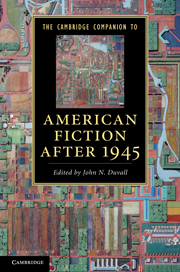Book contents
- Frontmatter
- Introduction: A story of the stories of American fiction after 1945
- PART I POETICS AND GENRES
- PART II HISTORICAL AND CULTURAL CONTEXTS
- 6 African American fiction
- 7 American Indian fiction
- 8 Multiethnicities: Latino/a and Asian American fiction
- 9 American Jewish Fiction
- 10 Feminist fiction
- 11 Southern fiction
- 12 Fiction and the Cold War
- 13 Fiction and 9/11
- PART III MAJOR AUTHORS
- Conclusion: Whither American fiction?
- Index
- Cambridge Companions to …
11 - Southern fiction
from PART II - HISTORICAL AND CULTURAL CONTEXTS
Published online by Cambridge University Press: 28 March 2012
- Frontmatter
- Introduction: A story of the stories of American fiction after 1945
- PART I POETICS AND GENRES
- PART II HISTORICAL AND CULTURAL CONTEXTS
- 6 African American fiction
- 7 American Indian fiction
- 8 Multiethnicities: Latino/a and Asian American fiction
- 9 American Jewish Fiction
- 10 Feminist fiction
- 11 Southern fiction
- 12 Fiction and the Cold War
- 13 Fiction and 9/11
- PART III MAJOR AUTHORS
- Conclusion: Whither American fiction?
- Index
- Cambridge Companions to …
Summary
In 1945, Allen Tate declared that “the Southern literary renascence … is over.” This was a startling claim, not least given its source: as a poet, novelist, and essayist, Tate had been both a creative participant in and critical shaper of the “renascence.” Ten years earlier, Tate had argued that “From the peculiar historical consciousness of the Southern writer has come good work of a special order” – literature that, by taking a “backward glance,” was “conscious of the past in the present.” Between 1929 and 1945, “good work” by Tate, William Faulkner, Thomas Wolfe, Robert Penn Warren, Richard Wright, Zora Neale Hurston, Eudora Welty, Carson McCullers, and others disproved H. L. Mencken's notorious accusation that the South was “almost as sterile, artistically, intellectually, culturally, as the Sahara Desert.” Tate's announcement that the Southern Renaissance was over, therefore, seemed premature: that same year, Welty published her powerful novel Delta Wedding (1945), while 1946 witnessed the appearance of Warren's opus All the King's Men. Furthermore, The Portable Faulkner (1946) triggered a rapid revival of interest in Faulkner that culminated with the 1949 Nobel Prize for Literature.
Yet in the 1950s modern Southern literature was, like the South itself, at a crossroads. The region, as both a social reality and a literary subject, was changing in profound ways. The prominent social, economic, and cultural role of what the Nashville Agrarians in I'll Take My Stand (1930) termed “the agrarian tradition” was in terminal decline.
- Type
- Chapter
- Information
- The Cambridge Companion to American Fiction after 1945 , pp. 154 - 166Publisher: Cambridge University PressPrint publication year: 2011

